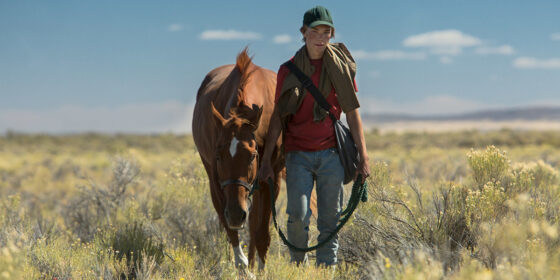Lean On Pete (Andrew Haigh, USA/United Kingdom) — Special Presentations
By Jay Kuehner
A girl and a gun or a boy and a horse? Andrew Haigh adapts Will Vlautin’s cautionary, melancholic neo-Western with a keen eye and ear for regional vernacular and class distinction. Haigh recognizes the potential in the story that Jane Smiley described as a “sheer cinema-vérité detailing of American life,” and hems along the rough edges of Charley’s (Charlie Plummer) scrappy teenage years as he transplants from Spokane to the outskirts of Portland with his charismatic but ultimately deadbeat dad (fatherly advice: the best women were all waitresses once). Cereal is kept in the fridge along with the beer, which is the way for Charley to state the obvious: “We’ve got roaches” is shorthand for poverty.
Haigh leans heavily on Charley’s innocence, best expressed through centring him in the frame and letting his body speak, the factors of poverty and abandonment as much as the elemental environment bearing upon him. But as in the like-minded American depression films of fellow Brit Andrea Arnold, this potentially visceral approach is subordinated by the advancement of narrative. A love for running and football, and a longing for a long-lost aunt, become backstory to Charley’s immediate job as a stable hand for a seedy quarter-horse handler (Steve Buscemi), who dopes his equine stable for quick race money and then moves on. “They’re not pets,” warns jockey Bonnie (Chloë Sevigny), who’s taken too many falls herself. But too late, because Charley has found his confidant in Pete, a horse destined for a life of servitude in Mexico after a series of defeats. They’re both broken.
Pete is no Balthazar, but Charley is some kind of Mouchette, even if Haigh never achieves a transcendent payoff thanks to some darker narrative turns that unforgivingly desert both. (If anything, the cinematic terrain evokes Kelly Reichardt and Roberto Minervini, while Charley appears to straddle the difference between Elizabeth Taylor’s passion in National Velvet and Harry Dean Stanton’s forlorn wandering in Paris, Texas). As for vérité, there are shades of social realism in Charley’s inexorable drift to the margins of America, but damnation and salvation are cinematically situated in a cramped trailer and a well-lit public library, respectively. If you can’t make friends with a horse, can you ask anything more from a film?



